Analysis of Trauma-Informed Care for Addiction & Mental Health
VerifiedAdded on 2023/04/24
|7
|1585
|474
Report
AI Summary
This report provides a comprehensive overview of trauma-informed care in the context of addiction treatment. It begins by defining trauma-informed care and its importance in creating a safe and healing environment for individuals with substance use disorders. The report delves into the nature of trauma, its various types, and its potential causes, emphasizing the high prevalence of trauma among individuals with addiction. It also highlights the significance of cultural sensitivity and self-care for practitioners in this field. Furthermore, the report identifies Relapse Prevention Therapy (RPT) as an effective treatment model for managing addictive symptoms within a trauma-informed framework, detailing its stages and strategies. Finally, the report contrasts the principles of trauma-informed care with the specific goals of RPT, emphasizing the need to address both the underlying trauma and the addictive behaviors to promote successful recovery. This document is available on Desklib, a platform offering a wide range of study resources for students.

Running head: ADDICTION
Trauma informed care
Name of the Student
Name of the University
Author Note
Trauma informed care
Name of the Student
Name of the University
Author Note
Paraphrase This Document
Need a fresh take? Get an instant paraphrase of this document with our AI Paraphraser
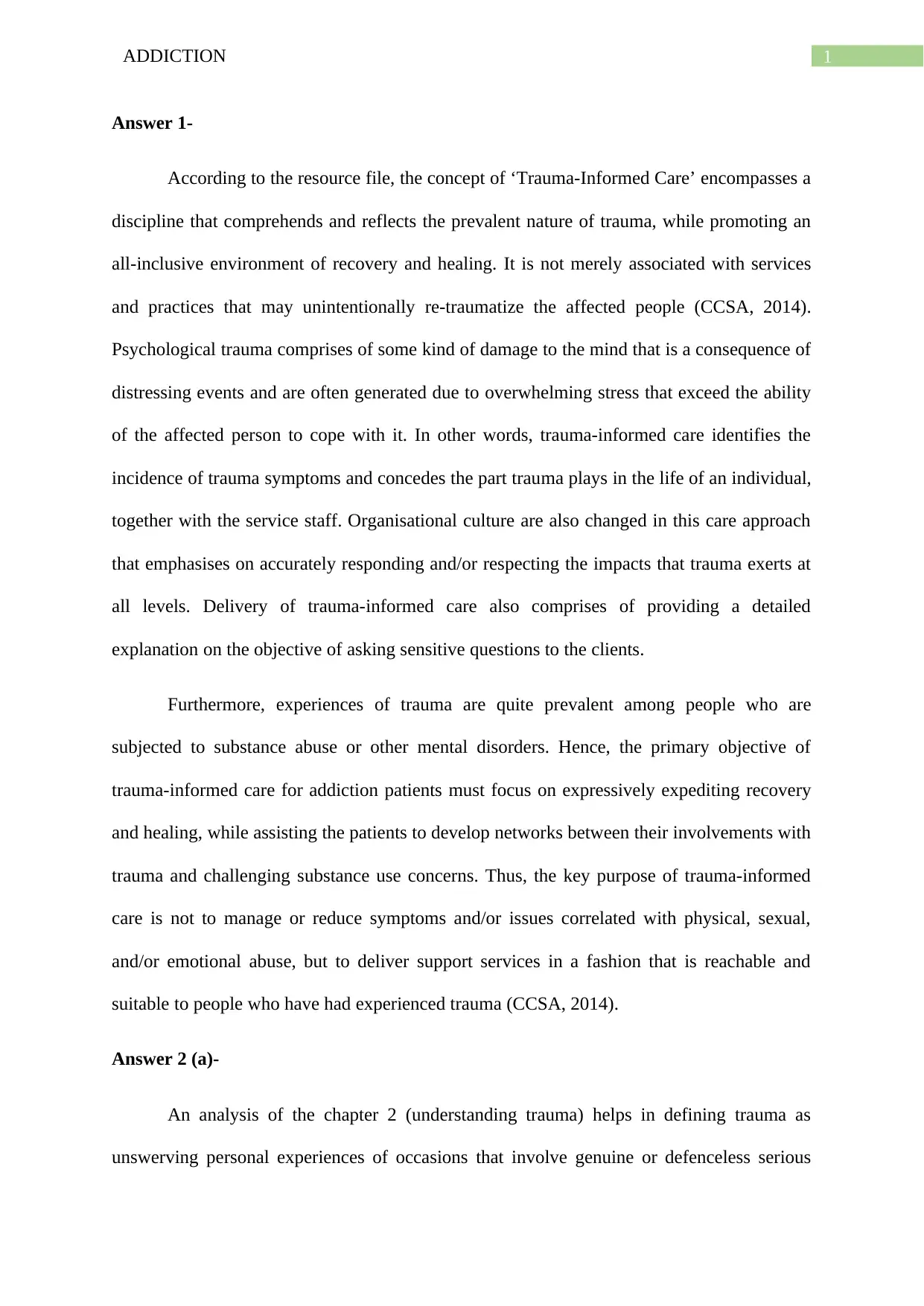
1ADDICTION
Answer 1-
According to the resource file, the concept of ‘Trauma-Informed Care’ encompasses a
discipline that comprehends and reflects the prevalent nature of trauma, while promoting an
all-inclusive environment of recovery and healing. It is not merely associated with services
and practices that may unintentionally re-traumatize the affected people (CCSA, 2014).
Psychological trauma comprises of some kind of damage to the mind that is a consequence of
distressing events and are often generated due to overwhelming stress that exceed the ability
of the affected person to cope with it. In other words, trauma-informed care identifies the
incidence of trauma symptoms and concedes the part trauma plays in the life of an individual,
together with the service staff. Organisational culture are also changed in this care approach
that emphasises on accurately responding and/or respecting the impacts that trauma exerts at
all levels. Delivery of trauma-informed care also comprises of providing a detailed
explanation on the objective of asking sensitive questions to the clients.
Furthermore, experiences of trauma are quite prevalent among people who are
subjected to substance abuse or other mental disorders. Hence, the primary objective of
trauma-informed care for addiction patients must focus on expressively expediting recovery
and healing, while assisting the patients to develop networks between their involvements with
trauma and challenging substance use concerns. Thus, the key purpose of trauma-informed
care is not to manage or reduce symptoms and/or issues correlated with physical, sexual,
and/or emotional abuse, but to deliver support services in a fashion that is reachable and
suitable to people who have had experienced trauma (CCSA, 2014).
Answer 2 (a)-
An analysis of the chapter 2 (understanding trauma) helps in defining trauma as
unswerving personal experiences of occasions that involve genuine or defenceless serious
Answer 1-
According to the resource file, the concept of ‘Trauma-Informed Care’ encompasses a
discipline that comprehends and reflects the prevalent nature of trauma, while promoting an
all-inclusive environment of recovery and healing. It is not merely associated with services
and practices that may unintentionally re-traumatize the affected people (CCSA, 2014).
Psychological trauma comprises of some kind of damage to the mind that is a consequence of
distressing events and are often generated due to overwhelming stress that exceed the ability
of the affected person to cope with it. In other words, trauma-informed care identifies the
incidence of trauma symptoms and concedes the part trauma plays in the life of an individual,
together with the service staff. Organisational culture are also changed in this care approach
that emphasises on accurately responding and/or respecting the impacts that trauma exerts at
all levels. Delivery of trauma-informed care also comprises of providing a detailed
explanation on the objective of asking sensitive questions to the clients.
Furthermore, experiences of trauma are quite prevalent among people who are
subjected to substance abuse or other mental disorders. Hence, the primary objective of
trauma-informed care for addiction patients must focus on expressively expediting recovery
and healing, while assisting the patients to develop networks between their involvements with
trauma and challenging substance use concerns. Thus, the key purpose of trauma-informed
care is not to manage or reduce symptoms and/or issues correlated with physical, sexual,
and/or emotional abuse, but to deliver support services in a fashion that is reachable and
suitable to people who have had experienced trauma (CCSA, 2014).
Answer 2 (a)-
An analysis of the chapter 2 (understanding trauma) helps in defining trauma as
unswerving personal experiences of occasions that involve genuine or defenceless serious
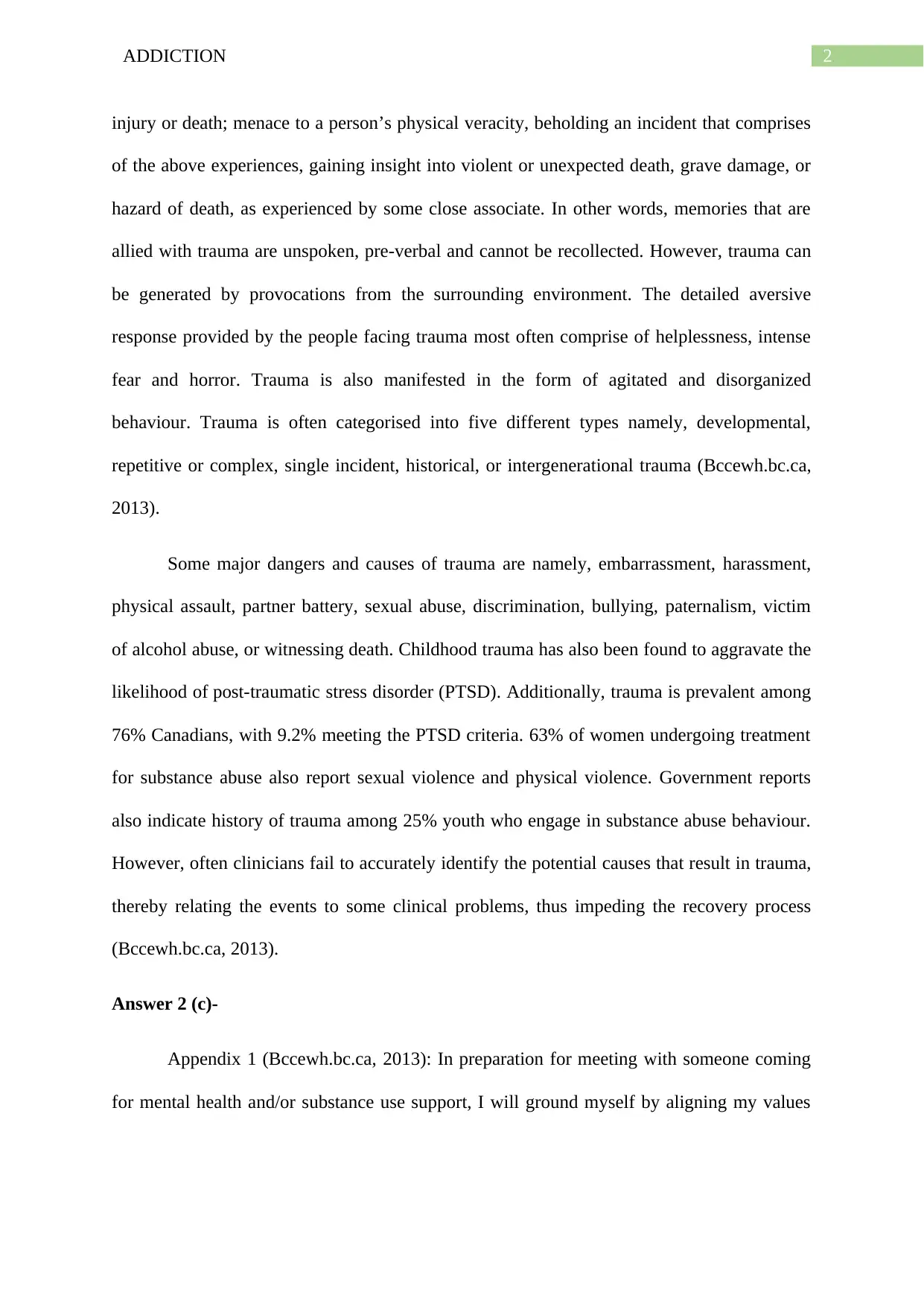
2ADDICTION
injury or death; menace to a person’s physical veracity, beholding an incident that comprises
of the above experiences, gaining insight into violent or unexpected death, grave damage, or
hazard of death, as experienced by some close associate. In other words, memories that are
allied with trauma are unspoken, pre-verbal and cannot be recollected. However, trauma can
be generated by provocations from the surrounding environment. The detailed aversive
response provided by the people facing trauma most often comprise of helplessness, intense
fear and horror. Trauma is also manifested in the form of agitated and disorganized
behaviour. Trauma is often categorised into five different types namely, developmental,
repetitive or complex, single incident, historical, or intergenerational trauma (Bccewh.bc.ca,
2013).
Some major dangers and causes of trauma are namely, embarrassment, harassment,
physical assault, partner battery, sexual abuse, discrimination, bullying, paternalism, victim
of alcohol abuse, or witnessing death. Childhood trauma has also been found to aggravate the
likelihood of post-traumatic stress disorder (PTSD). Additionally, trauma is prevalent among
76% Canadians, with 9.2% meeting the PTSD criteria. 63% of women undergoing treatment
for substance abuse also report sexual violence and physical violence. Government reports
also indicate history of trauma among 25% youth who engage in substance abuse behaviour.
However, often clinicians fail to accurately identify the potential causes that result in trauma,
thereby relating the events to some clinical problems, thus impeding the recovery process
(Bccewh.bc.ca, 2013).
Answer 2 (c)-
Appendix 1 (Bccewh.bc.ca, 2013): In preparation for meeting with someone coming
for mental health and/or substance use support, I will ground myself by aligning my values
injury or death; menace to a person’s physical veracity, beholding an incident that comprises
of the above experiences, gaining insight into violent or unexpected death, grave damage, or
hazard of death, as experienced by some close associate. In other words, memories that are
allied with trauma are unspoken, pre-verbal and cannot be recollected. However, trauma can
be generated by provocations from the surrounding environment. The detailed aversive
response provided by the people facing trauma most often comprise of helplessness, intense
fear and horror. Trauma is also manifested in the form of agitated and disorganized
behaviour. Trauma is often categorised into five different types namely, developmental,
repetitive or complex, single incident, historical, or intergenerational trauma (Bccewh.bc.ca,
2013).
Some major dangers and causes of trauma are namely, embarrassment, harassment,
physical assault, partner battery, sexual abuse, discrimination, bullying, paternalism, victim
of alcohol abuse, or witnessing death. Childhood trauma has also been found to aggravate the
likelihood of post-traumatic stress disorder (PTSD). Additionally, trauma is prevalent among
76% Canadians, with 9.2% meeting the PTSD criteria. 63% of women undergoing treatment
for substance abuse also report sexual violence and physical violence. Government reports
also indicate history of trauma among 25% youth who engage in substance abuse behaviour.
However, often clinicians fail to accurately identify the potential causes that result in trauma,
thereby relating the events to some clinical problems, thus impeding the recovery process
(Bccewh.bc.ca, 2013).
Answer 2 (c)-
Appendix 1 (Bccewh.bc.ca, 2013): In preparation for meeting with someone coming
for mental health and/or substance use support, I will ground myself by aligning my values
⊘ This is a preview!⊘
Do you want full access?
Subscribe today to unlock all pages.

Trusted by 1+ million students worldwide

3ADDICTION
and principles with the culture of the client in order to prevent display of any discriminating
attitude.
I will remind myself that regardless of the cultural, racial, or ethnic background of the
patient, I am supposed to offer best care services, with the aim of effectively reducing or
managing the presenting complaints.
Steps I will take to understand cultural context and diversity encompass becoming
self-aware, talking to people from diverse cultures, becoming more accepting, avoiding
stereotyping attitude, and recognising the uniqueness of all individuals.
I will know the work is starting to have a negative effect on me when I will grow
impatient and stop being an active listener to the complaints and concerns of the patient.
If that starts to happen, I will ground myself by recognising the source of stress and
worry, altering my behaviour, creating a schedule, demonstrating a willingness to
compromise, sharing my feelings, reframing my problems.
Someone who can offer me support
1) At work: colleagues and mentor
2) Outside of work: friends, family members, and motivational speakers
Two self-care strategies that help me manage are regular exercise and maintaining social
support. Exercising regularly will help in relieving stress, thus keeping the body healthy. It
will also facilitate the release of endorphin hormones that will increase the sense of
wellbeing. Social support will act in the form of a buffer against stress. Expanding the social
circle and cultivating supportive friendships will also prove effective.
Answer 3-
and principles with the culture of the client in order to prevent display of any discriminating
attitude.
I will remind myself that regardless of the cultural, racial, or ethnic background of the
patient, I am supposed to offer best care services, with the aim of effectively reducing or
managing the presenting complaints.
Steps I will take to understand cultural context and diversity encompass becoming
self-aware, talking to people from diverse cultures, becoming more accepting, avoiding
stereotyping attitude, and recognising the uniqueness of all individuals.
I will know the work is starting to have a negative effect on me when I will grow
impatient and stop being an active listener to the complaints and concerns of the patient.
If that starts to happen, I will ground myself by recognising the source of stress and
worry, altering my behaviour, creating a schedule, demonstrating a willingness to
compromise, sharing my feelings, reframing my problems.
Someone who can offer me support
1) At work: colleagues and mentor
2) Outside of work: friends, family members, and motivational speakers
Two self-care strategies that help me manage are regular exercise and maintaining social
support. Exercising regularly will help in relieving stress, thus keeping the body healthy. It
will also facilitate the release of endorphin hormones that will increase the sense of
wellbeing. Social support will act in the form of a buffer against stress. Expanding the social
circle and cultivating supportive friendships will also prove effective.
Answer 3-
Paraphrase This Document
Need a fresh take? Get an instant paraphrase of this document with our AI Paraphraser
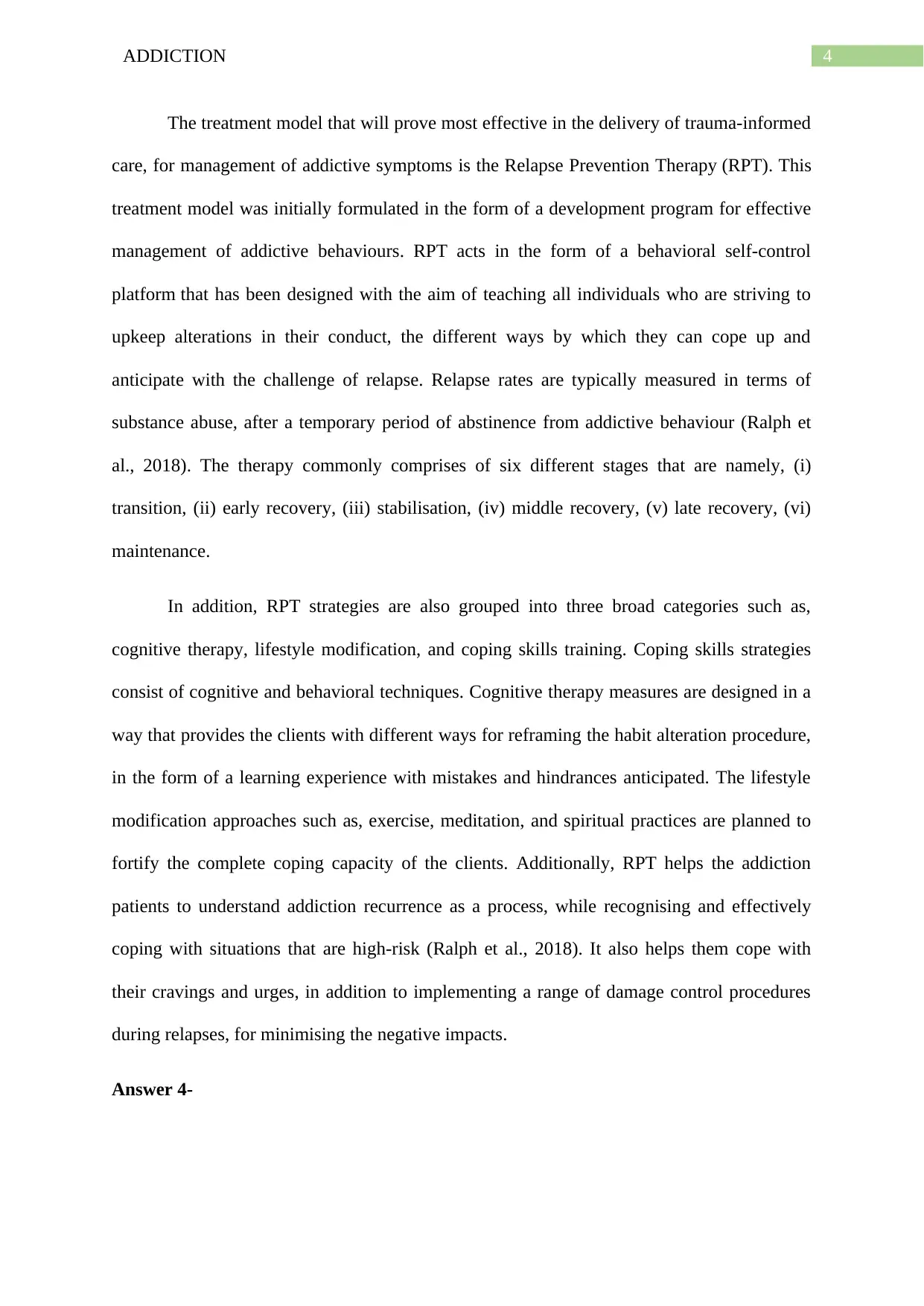
4ADDICTION
The treatment model that will prove most effective in the delivery of trauma-informed
care, for management of addictive symptoms is the Relapse Prevention Therapy (RPT). This
treatment model was initially formulated in the form of a development program for effective
management of addictive behaviours. RPT acts in the form of a behavioral self-control
platform that has been designed with the aim of teaching all individuals who are striving to
upkeep alterations in their conduct, the different ways by which they can cope up and
anticipate with the challenge of relapse. Relapse rates are typically measured in terms of
substance abuse, after a temporary period of abstinence from addictive behaviour (Ralph et
al., 2018). The therapy commonly comprises of six different stages that are namely, (i)
transition, (ii) early recovery, (iii) stabilisation, (iv) middle recovery, (v) late recovery, (vi)
maintenance.
In addition, RPT strategies are also grouped into three broad categories such as,
cognitive therapy, lifestyle modification, and coping skills training. Coping skills strategies
consist of cognitive and behavioral techniques. Cognitive therapy measures are designed in a
way that provides the clients with different ways for reframing the habit alteration procedure,
in the form of a learning experience with mistakes and hindrances anticipated. The lifestyle
modification approaches such as, exercise, meditation, and spiritual practices are planned to
fortify the complete coping capacity of the clients. Additionally, RPT helps the addiction
patients to understand addiction recurrence as a process, while recognising and effectively
coping with situations that are high-risk (Ralph et al., 2018). It also helps them cope with
their cravings and urges, in addition to implementing a range of damage control procedures
during relapses, for minimising the negative impacts.
Answer 4-
The treatment model that will prove most effective in the delivery of trauma-informed
care, for management of addictive symptoms is the Relapse Prevention Therapy (RPT). This
treatment model was initially formulated in the form of a development program for effective
management of addictive behaviours. RPT acts in the form of a behavioral self-control
platform that has been designed with the aim of teaching all individuals who are striving to
upkeep alterations in their conduct, the different ways by which they can cope up and
anticipate with the challenge of relapse. Relapse rates are typically measured in terms of
substance abuse, after a temporary period of abstinence from addictive behaviour (Ralph et
al., 2018). The therapy commonly comprises of six different stages that are namely, (i)
transition, (ii) early recovery, (iii) stabilisation, (iv) middle recovery, (v) late recovery, (vi)
maintenance.
In addition, RPT strategies are also grouped into three broad categories such as,
cognitive therapy, lifestyle modification, and coping skills training. Coping skills strategies
consist of cognitive and behavioral techniques. Cognitive therapy measures are designed in a
way that provides the clients with different ways for reframing the habit alteration procedure,
in the form of a learning experience with mistakes and hindrances anticipated. The lifestyle
modification approaches such as, exercise, meditation, and spiritual practices are planned to
fortify the complete coping capacity of the clients. Additionally, RPT helps the addiction
patients to understand addiction recurrence as a process, while recognising and effectively
coping with situations that are high-risk (Ralph et al., 2018). It also helps them cope with
their cravings and urges, in addition to implementing a range of damage control procedures
during relapses, for minimising the negative impacts.
Answer 4-
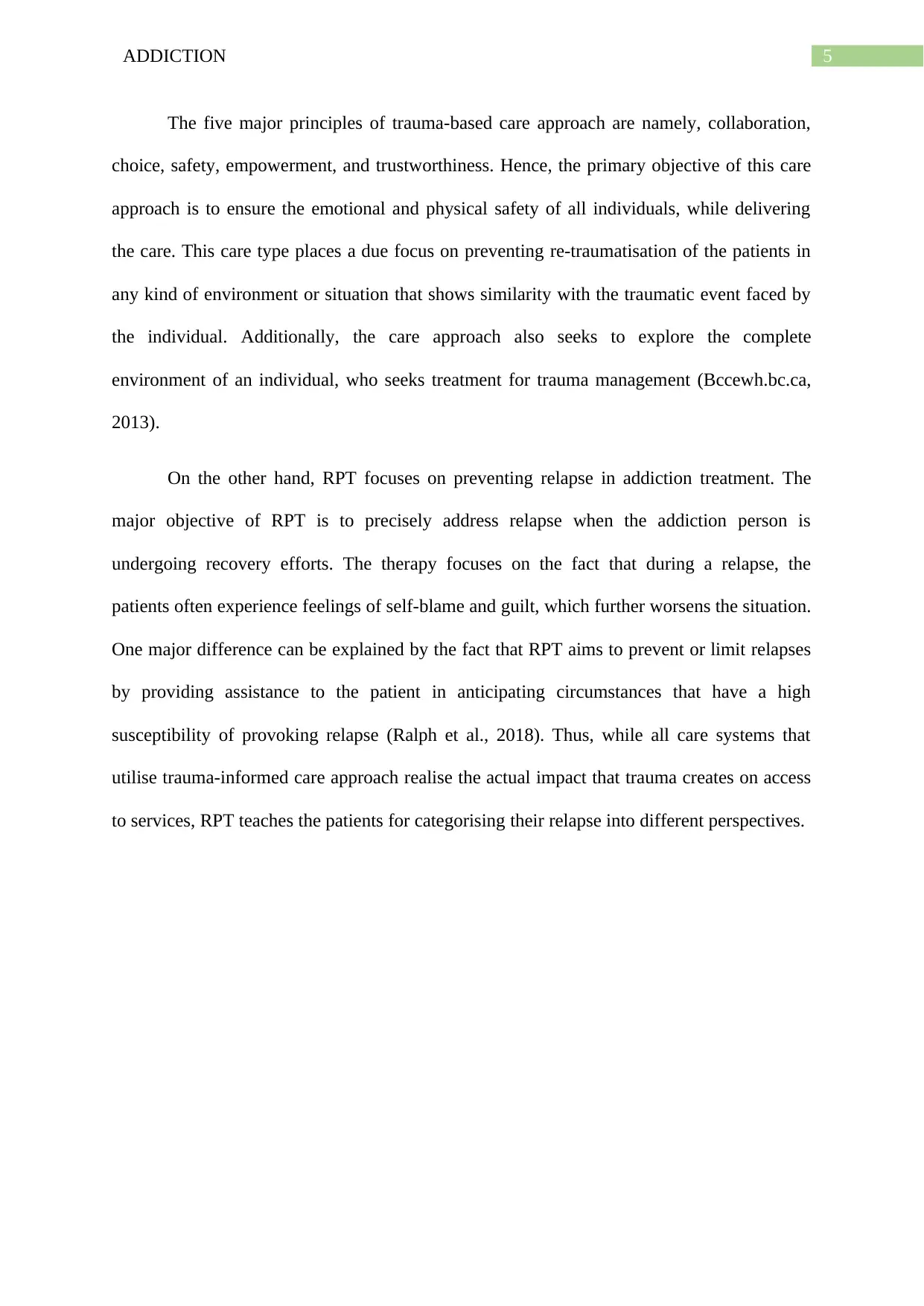
5ADDICTION
The five major principles of trauma-based care approach are namely, collaboration,
choice, safety, empowerment, and trustworthiness. Hence, the primary objective of this care
approach is to ensure the emotional and physical safety of all individuals, while delivering
the care. This care type places a due focus on preventing re-traumatisation of the patients in
any kind of environment or situation that shows similarity with the traumatic event faced by
the individual. Additionally, the care approach also seeks to explore the complete
environment of an individual, who seeks treatment for trauma management (Bccewh.bc.ca,
2013).
On the other hand, RPT focuses on preventing relapse in addiction treatment. The
major objective of RPT is to precisely address relapse when the addiction person is
undergoing recovery efforts. The therapy focuses on the fact that during a relapse, the
patients often experience feelings of self-blame and guilt, which further worsens the situation.
One major difference can be explained by the fact that RPT aims to prevent or limit relapses
by providing assistance to the patient in anticipating circumstances that have a high
susceptibility of provoking relapse (Ralph et al., 2018). Thus, while all care systems that
utilise trauma-informed care approach realise the actual impact that trauma creates on access
to services, RPT teaches the patients for categorising their relapse into different perspectives.
The five major principles of trauma-based care approach are namely, collaboration,
choice, safety, empowerment, and trustworthiness. Hence, the primary objective of this care
approach is to ensure the emotional and physical safety of all individuals, while delivering
the care. This care type places a due focus on preventing re-traumatisation of the patients in
any kind of environment or situation that shows similarity with the traumatic event faced by
the individual. Additionally, the care approach also seeks to explore the complete
environment of an individual, who seeks treatment for trauma management (Bccewh.bc.ca,
2013).
On the other hand, RPT focuses on preventing relapse in addiction treatment. The
major objective of RPT is to precisely address relapse when the addiction person is
undergoing recovery efforts. The therapy focuses on the fact that during a relapse, the
patients often experience feelings of self-blame and guilt, which further worsens the situation.
One major difference can be explained by the fact that RPT aims to prevent or limit relapses
by providing assistance to the patient in anticipating circumstances that have a high
susceptibility of provoking relapse (Ralph et al., 2018). Thus, while all care systems that
utilise trauma-informed care approach realise the actual impact that trauma creates on access
to services, RPT teaches the patients for categorising their relapse into different perspectives.
⊘ This is a preview!⊘
Do you want full access?
Subscribe today to unlock all pages.

Trusted by 1+ million students worldwide
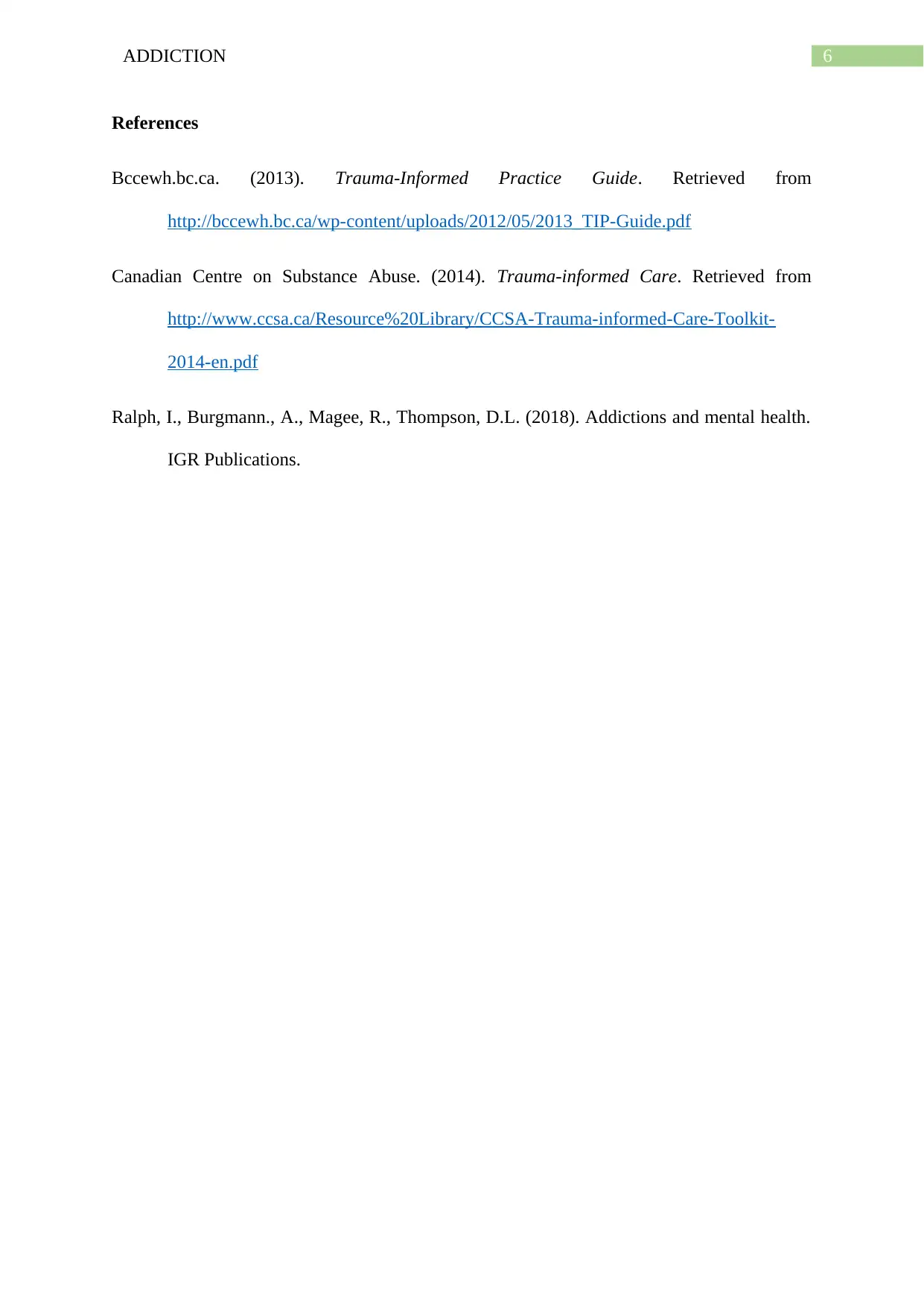
6ADDICTION
References
Bccewh.bc.ca. (2013). Trauma-Informed Practice Guide. Retrieved from
http://bccewh.bc.ca/wp-content/uploads/2012/05/2013_TIP-Guide.pdf
Canadian Centre on Substance Abuse. (2014). Trauma-informed Care. Retrieved from
http://www.ccsa.ca/Resource%20Library/CCSA-Trauma-informed-Care-Toolkit-
2014-en.pdf
Ralph, I., Burgmann., A., Magee, R., Thompson, D.L. (2018). Addictions and mental health.
IGR Publications.
References
Bccewh.bc.ca. (2013). Trauma-Informed Practice Guide. Retrieved from
http://bccewh.bc.ca/wp-content/uploads/2012/05/2013_TIP-Guide.pdf
Canadian Centre on Substance Abuse. (2014). Trauma-informed Care. Retrieved from
http://www.ccsa.ca/Resource%20Library/CCSA-Trauma-informed-Care-Toolkit-
2014-en.pdf
Ralph, I., Burgmann., A., Magee, R., Thompson, D.L. (2018). Addictions and mental health.
IGR Publications.
1 out of 7
Related Documents
Your All-in-One AI-Powered Toolkit for Academic Success.
+13062052269
info@desklib.com
Available 24*7 on WhatsApp / Email
![[object Object]](/_next/static/media/star-bottom.7253800d.svg)
Unlock your academic potential
Copyright © 2020–2026 A2Z Services. All Rights Reserved. Developed and managed by ZUCOL.



